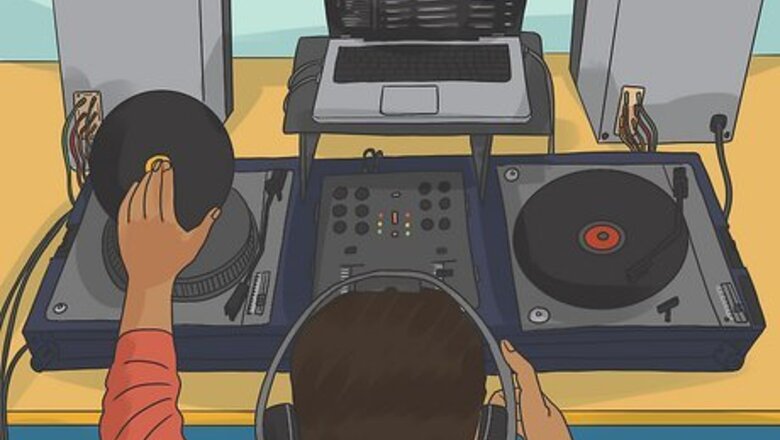
views
- Practice your DJing on a simple, bare-bones set of equipment. All you really need to build your musical skills are a turntable, a mixer, and some musical software.
- Learn the BPM of each song you play. Then, mix songs with similar BPMs so the transitions are clean and the groove stays consistent.
- Build your sound and musical personality over time. Figure out what genres you like to play. Are you hardcore or glitch? Trance or lo-fi? The more you master, the better!
Assembling the Grooviest Equipment
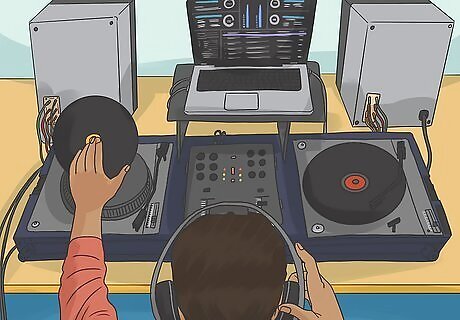
Practice the basics on a simple setup. Being a DJ requires you to do a lot more than just play songs. Structuring sets, mixing on the fly, and getting a crowd moving are all essential tricks of the trade. Start practicing with a bare-bones kit. Later on, you can invest in more advanced stuff like a MIDI controller, an audio interface, and various plug-ins. However, when you’re beginning your DJ career, just get the following basic equipment: 2 turntables or 2 CD players (for record scratching) 2-channel mixer (for mixing tracks) Headphones Speakers Mixing software Be economical. You don’t need super high-tech speakers or software. Invest most of your money in a turntable or mixer (which often come used and still highly effective for a much lower cost).
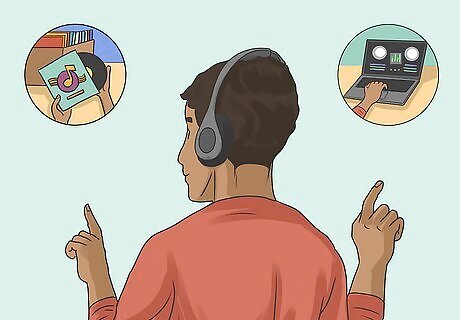
Compare analog and digital kits. Traditional DJ set-ups play vinyl records on direct-drive turntables. However, it's become increasingly common to use CD-style and straight-digital set-ups too. Both have their advantages and disadvantages, but are perfectly effective for playing gigs and becoming a DJ. Analog set-ups will allow you to DJ in the most traditional way, learning the skills the way they were pioneered: scratching a stylus against vinyl. This will require you to choose a long-lasting turntable and amass a sizable collection of vinyl records to play, which can be somewhat expensive. Digital set-ups allow you to be extremely mobile, and the learning curve will be much smaller. Learning to beat-match and transition, for example, will be much easier with a BPM (beats per minute) counter and an online software to assist you.

Get a mixing software package. A quality software can teach you skills like looping songs, controlling time, and mixing audio in an easy, user-friendly way. Serato Scratch and Traktor are great programs that can read any format of music and select songs through a computer program interface. Pioneer and Numark also offer various products you may want to look into. These programs will enable you to access a library of MP3s on your hard drive to complement your vinyl and CD selections. More often than not, these programs provide live looping and scratching capability, delays and reverberations, as well as video and karaoke options. Ableton is a program that allows you to connect mixing controllers via USB cable. It's great for beginners and super budget-friendly. Some music-mixing software may be hard to learn. You can find great tutorials online for most types. Otherwise, DJ schools can teach you about the cutting-edge stuff out there—but know that you can do it yourself.

Set up a home studio to rehearse and experiment. Most DJs record demos, playlists, and original music at home. Ensure that the equipment you bring to the club compliments the equipment you use at your place. For example, if you're a hip-hop DJ, you'll probably want to invest in a scratch/battle mixer at home to simulate a competition environment when you play gigs. A home studio will be especially useful if you ever plan on producing or remixing songs of your own. Becoming a DJ is an extremely fun, but serious time commitment. Try to rehearse and experiment in your studio at least an hour a day.

Study the equipment needed for each type of gig. Not all DJ venues are the same. If you plan to play for a place that already has a DJ setup, you might only need a laptop with music mixing software. If you plan to play in private venues, provide your own equipment. Scope out what you need and what you don't for each particular job. If you're serious about being a DJ, odds are you're aware of a few in your area. Hit them up for advice or for a tutorial on their system! If they're half as passionate as you are, they'll love to give you a minute of their time to explain their ways.

Build (and prepare to pay for) a big collection of music. To be a real DJ, get lots and lots of quality music to mix and remix. Since you want the audio to be crisp and clear for the gigs you play, you’ll also (at least eventually) have to pay for the songs in your library. For now, work with what you have. Hit up your friends to trade sounds. Consult the charts, YouTube channels of record companies, and websites catering especially to DJs (like Beatport). Here's a list of music genres to explore: House Trance Techno Electro Glitch Dark Alternative Progressive Breakbeat Hardstyle Hardcore Downtempo Jungle Drum and Bass Dubstep Hip-Hop Lo-fi
Mastering Your Music

Count the BPM of the songs you play. The beats per minute (BPM) of a song will determine how smoothly or easily you can mix it with another song. Most mixers and DJ software will calculate the BPM of a track for you. However, these may not be fully accurate 100% of the time, so have some sense of the BPMs yourself. Find out your songs’ BPM by looking it up online or counting the time signature as you listen. You can also use a pitch warp to match the beats, but only use it on a song that doesn't have vocals yet. Speeding it up or slowing it down changes the key and messes with everything. It's best to choose 2 songs that are only a few BPM off for the most seamless transitions.
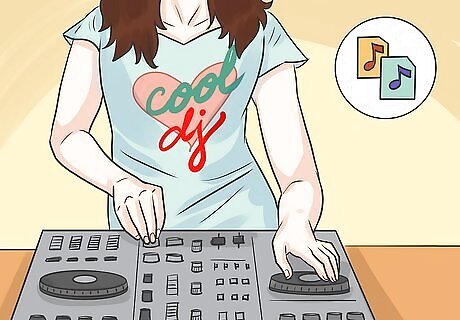
Listen to your songs’ intros and outros until they’re second nature. Most dance songs will have an intro and corresponding outro where the music plays without vocals. DJ mixing usually means blending one song's intro with the outro of another. Knowing when an outro starts and an intro begins is critical to live beat mixing. Have your 2nd song ready to go as your 1st one is winding down. Keep a hand on the turntable or CD player's pitch knob to adjust the speed if your BPMs don't match. Keep your other hand on the crossfader, so you can raise the volume of the 2nd song as you lower the volume of the first.

Practice scratching on a turntable. Scratching is an essential art form when it comes to DJing. Use your fingertips to stop the record at various intervals; this can create uniquely layered songs and sound effects. If you don’t have a turntable, you can use your decks as pseudo-records to get your scratch on. Learn the different types of scratches too. There are baby scratches and scribble scratches, and drags and scratches that work at different pitch levels. Get 'em all down before you head out there! Certain places in songs are prime for scratching, while others are terrible for it. Knowing when to scratch is like comedic timing: you'll know it when it's right and when it's just wrong.

Mix similar songs together at first. When you're starting out, make mixing easier by sticking to 2 songs that are within 3 BPMs of each other. Also, ensure that these 2 songs are in the same key. (Your software should be able to tell you this). Once you nail that down, start experimenting with looping and then move on to your toggle function for adding effects. Experiment with the different methods on your mixer. For most effects, there's more than 1 way to do them. Find what you prefer. Generally, 1 method is a very do-it-yourself way and the other is more automated.

Transition between the songs smoothly. Seamlessly shift from the beat of 1 song to another, so your crowd can dance, uninterrupted. To transition on conventional DJ hardware, listen to the second song's intro in your headphones and move the pitch slider until the songs play at the same speed. Then, queue the 2nd song simultaneously with the preceding song. Adjust the volume levels of the songs as you transition. The song you’re changing out of will be playing at full volume, so adjust the 2nd volume up slowly and subtly. Never mix vocals over other vocals or the noise will be awkward. Digitally, it's possible to use beat-matching software to do transitions automatically (provided that the songs are within a few BPM of one another). However, it's still good to learn how to do this analog, since it’s a fundamental skill.
Learning the Craft

Be prepared to spend years improving your skills. While DJing might start off as a hobby, it can eventually turn into a lucrative and life-changing career. However, this won’t happen overnight. To become a DJ is to devote years to working magic on others' music. Enjoy the journey and practice every day to make the best songs you can. You probably won’t make a whole lot of money at first, but if you keep at it, several DJs make well over $70,000 a year. DJing may feel difficult at first. You’re still learning the basics, so your songs probably sound pretty rough around the edges. Don’t give up! Soon, the music will become second nature and playing will become a breeze.

Try working as both a crowd-pleaser or a music specialist. Know that certain gigs will require that you make a few compromises. A college bar may want to hear Katy Perry when you're just trying to forget Last Friday Night, but they’ll pay better. Meanwhile, being a specialist will give you a lot more cred with the DJs and critics, but it may make your gigs fewer and far between. Crowd pleasing means playing songs that would, most likely, fit the taste of the biggest number of people in any given crowd. This style of DJing is best suited to private events, such as weddings or small parties. A music specialist sticks to a particular genre of music, regardless of what the crowd demands. Usually, these DJs play nightclubs that have specific genre standards or they have an established following based on a certain type of music.

Listen to other DJs for inspiration. Find a DJ whose style you admire and observe them as much as possible. Pay attention to how songs are constructed and how the crowd is managed. After you've watched them a few times, approach the DJ after the show and ask for a few tips. Most DJs will be happy to help guide you if they know you're serious. Gain inspiration from the DJs that hit it big. Sometimes, it can help to look up to professionals such as Headhunterz, Tiesto, Avicii, Knife Party, Sebastian Ingrosso, and Skrillex. EXPERT TIP Amber Crain Amber Crain wikiHow Staff Writer Amber Crain has been a member of wikiHow’s writing staff for the last six years. She graduated from the University of Houston where she majored in Classical Studies and minored in Painting. Before coming to wikiHow, she worked in a variety of industries including marketing, education, and music journalism. She's been a radio DJ for 10+ years and currently DJs a biweekly music program on the award-winning internet radio station DKFM. Her work at wikiHow supports her lifelong passion for learning and her belief that knowledge belongs to anyone who desires to seek it. Amber Crain Amber Crain wikiHow Staff Writer "Mixcloud is an amazing resource if you'd like to explore a wide range of DJ styles, genres, and personalities, especially if you're still figuring out your own style. You can also upload DJ mixes, connect with other DJs, and build an online following via Mixcloud. This platform has been an invaluable tool for me as a DJ."

Get comfortable DJing multiple genres of music. You can still be a specialist if you have multiple genres under your belt—you're just a specialist with versatility. For example, you may create lo-fi music and mix it with underground rap (like RZA and J Dilla) or play dancey house music with a side of pop (like Steve Aoki and Deadmau5). Most DJs are great at one genre of music, but being great at multiple sets you up to be the cream of the crop. This also offers you more opportunities for future gigs. Instead of only having 1 or 2 clubs in the area that'll have you, you can do those, a few other clubs, and the occasional wedding or hoppin' bar mitzvah.

Keep up with current music trends. To be viable in today's fast-paced world, be on top of all the charts and where it seems like the trends are going. Browse music blogs regularly, watch the Grammys, read publications like Pitchfork to get insight on people’s taste, and talk to other artists to learn what the music of tomorrow may look like. Keep a list of ideas and notes on popular trends. Refer to these every so often for inspiration.
Building a Following

Find a place to DJ at regularly. Just like a pilot builds up flight time to get cred, build up as much play time as you can. The best way to do this is to get recurring hours through an established company—not just those one-off gigs. Sign up to work at a local college or community radio station, look for venues that need between-band DJs, or offer some pro bono mixing at a nearby club to get practice. You can also find companies that supply DJs to weddings and similar events. You won't be freelancing, but you'll be getting your foot in the door.

Curate your sound to each unique crowd. Having an idea of who your crowd is before the event begins is critical to successful DJing. If you're playing a wedding, for instance, play more slow songs than usual, and try to get a grasp on the bride and groom's musical tastes beforehand. If you're playing a nightclub, get familiar with what the club owner prefers and what the regulars like. The regulars keep the club afloat and, by extension, pay your fee; learn how to keep them happy. Be careful with requests. If you're playing a nightclub that caters to a hip-hop crowd and a tourist requests a song that doesn't fit with the genre, consider it carefully before you play it. Remember, your aim is to keep the core of the audience happy and coming back. If at all possible, visit the venue beforehand. Getting a feel for the regular crowd before you go can help take the pressure off a new gig.

Market yourself at each gig. Make press kits, create a social media page, hand out business cards, email clubs constantly, and talk to other artists and club promoters to keep expanding your network. As you're gaining a fan base, play as many shows as necessary to get your name out there. This is not a 9-5 job. It’s a 24/7 one. Book yourself on a tight schedule at first to keep your interest alive and your creativity fresh. Basically, at the beginning: take whatever gigs you can.

Develop an online presence. If you don't have the time or money to build your own website, start an account for your DJing career on Twitter or Facebook. Promote your shows, connect with your fans, and personally respond to their messages. The more you're a real person to these people, the more they’ll recommend you. Making playlists is a great way to build your presence. Share these playlists with your fans so they can sample your musical tastes and get their appetites wet for your future shows.

Play gigs for a low price to get your foot in the door. Start by playing small, private events for a low fee, or take a slow, weeknight shift at a club or bar. Ask a friend who's hosting a party if you can DJ. Be aware that if you're inexperienced, you won't make much money at first and you'll probably have to keep a second job. But you'd do this for free, right? When you first start off, people may book you on the stipulation that you bring X number of people. This shouldn’t be your responsibility, but sometimes you gotta take what you can get. Know that these people are only the ones you're working with now; avoid them in the future.
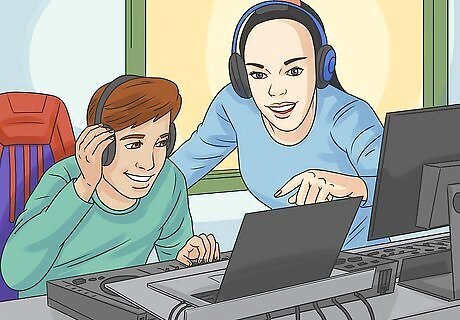
Become a DJ-Producer. You’ll have more success as a DJ if you know how to produce your own music. You can still work with others' tunes, but you're mashing it all up, remixing it, re-editing it, and making it better. Several famous DJs built their fanbase on YouTube doing exactly this! You can rake in the cash a lot faster when you start producing your own stuff. Once you have your own catalog of songs, hit up some record labels. Even if you don't end up being a top-billing artist, you can work behind the scenes with other artists doing what you love.
Making DJing Your Career
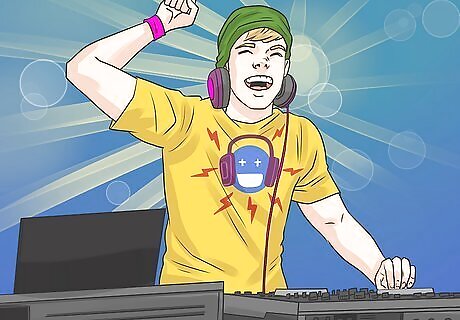
Build your on-stage persona and charisma. As a DJ, you’re responsible for entertaining a large group of people all by yourself. Work on your stage presence. Don't just stand there hunched over your decks. Shout, jump, and tell the crowd to “MAKE SOME NOISE!” to get them hyped. Sometimes, the crowd may just want to sit back and groove. Learn to read the room and when it’s best to just play your songs.

Use each song to work the crowd’s vibe. Curate your music so it moves each moment in the night forward. Divide different styles of songs into different sections. Play slower, quieter songs at the beginning of the party. Slowly slip into a jazzier groove, and pull out the heavier songs at the end. Above all, read the crowd and notice what they're responding to. Don't play mostly fast songs at a wedding. This will take away from the romantic atmosphere. Don't play mostly slow songs at a gathering of kids. They will get bored fast. Have a starter song that’s really upbeat. You can transition to some other slower stuff quickly if necessary, but you want to set the tone with lots of energy.

Behave professionally. Show up to your events on time and fully prepared. Treat your bosses with respect. Give each gig your best effort. Have fun with the crowd, but keep your interactions respectful, since you never know who's watching. There can be some real scumbags in the music scene. You want to be that good apple that isn't a part of the bunch. If you behave unprofessionally, there are lots of others waiting to take your spot. Never put another DJ down. The DJ community is tight. If you get a negative reputation, you'll regret it.

Handle the music industry BS with care. Working in clubs and the like isn't always a pretty picture. A lot of times (especially when you’re starting out), the majority of your listeners will be some level of drunk, high, or both. They may give you a hard time on occasion. Learn to let it go. In one ear and out the other! In addition to rowdy or unappreciative crowds, you may have to deal with shady promoters and technical disasters. Use your savvy people skills to navigate through these issues and let them make you stronger.

Have fun with your music. Imagine going to a show (maybe you’ve already been to one) where the DJ is just pushing buttons like they’d rather be hauling rocks. It's terrible. Watching a DJ that doesn't even like their own music is practically worse than a three-piece polka band with earplugs. Make it clear that you're enjoying yourself and the crowd will follow suit. Smile and dance when you feel like it. Even if you’re focused, you want to convey to the audience that you love your craft. Go a bit crazy if you feel like it. The more you feel the music, the better you'll be able to read the crowd. The more accurately you read the crowd, the more they’ll want you back for the next show.
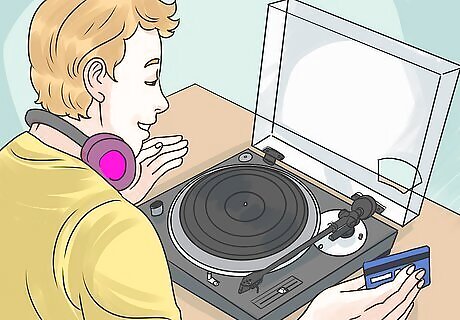
Upgrade your equipment and rates once you have a following. Once you’ve got a comfortable amount of followers and some quality gigs under your belt, you can up the ante. When the money is coming in at more than a trickle, upgrade your equipment. The industry standard is the Technics 1200, but you can even upgrade from there. You're looking at a few thousand dollars in the long run, but you'll make it back and then some. Start figuring out your rates. How much are you worth? Account for distance traveled, if you're bringing your own equipment, and the general realities of the gig (some are quite clearly better than others). And don't forget: are they feeding you? Upgrade from free and cheap gigs as soon as possible. You don't want to be typecast as a "cheap DJ." Clients should be hiring you because you’re good, not because you’re cheap.











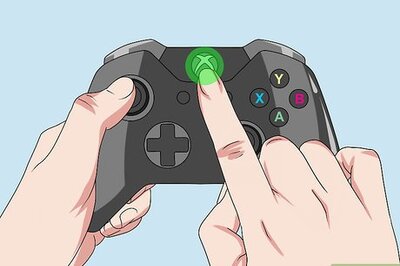



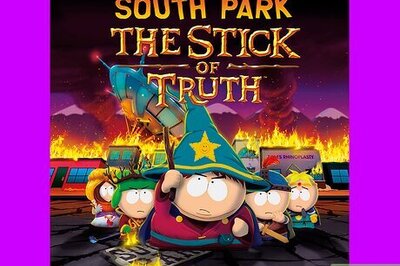
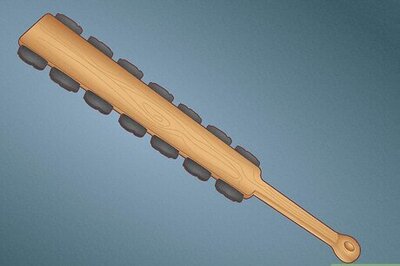
Comments
0 comment